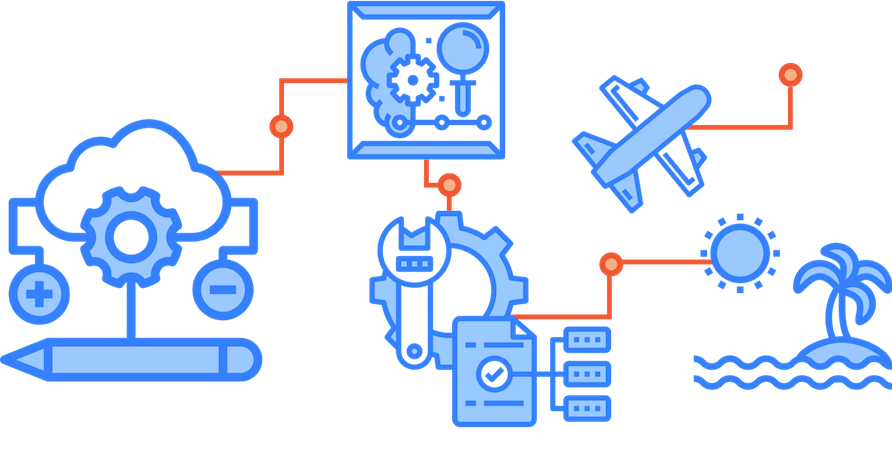Taking vacation is about resting, relaxing and de-stressing. Numerous studies have shown that employees who take vacations get better sleep, have lower risk of heart disease, and come back more motivated to produce amazing new things.
And yet, people are stressed about taking vacation. A survey through Healthline found that ~62% of 2,280 readers said that they experienced “very or somewhat” elevated stress levels during the winter holidays — which means employees came back to work just as stressed as before.
Employees might stress about the process of requesting vacation, or about what coworkers think about them for taking it. This creates feelings of guilt and anxiety, which can prevent them from using their paid time off.
Employees are often caught up in the “what ifs” too easily. “What if my vacation request doesn’t get approved,” or “What if I don’t finish enough work before I leave,” or “What if I leave and somebody needs me?” Questions like these can lead employees away from much-needed vacation time, resulting in overworked employees who don’t produce as much high quality content.
What Can You Do to Take Control of Your Vacation?
Plan Your Vacation in Advance

Research shows that a big boost in happiness comes from planning a vacation, and a person can feel the effects up to eight weeks before the trip. In contrast, planning a vacation last-minute actually negates a lot of the benefits of taking one in the first place.
Let Coworkers Know What You Need From Them
Proactively collaborate with coworkers in advance of your departure. Let them know exactly when you’re away, and exactly what they’ll need to do to keep project(s) on track. This ensures that you can completely detach from work while on vacation. Let them know of any changes in advance, and trust in their ability to cover for you.
Plan Your Transition Back Into the Office
Employees usually plan ahead when heading out of the office, but don’t pay enough attention to their needs when coming back in. The American Psychological Association (APA) states that if you do not set up adequate transition time after your vacation, you almost immediately negate the benefits of the time off due to high stress levels.
One way you can ensure transition time is to use a “pre-vacation check-list” like the one here. Ask yourself:
- What tasks and projects can I complete before I leave?
- What tasks can’t wait until I come back?
- What projects require attention while I’m away?
- What days leading up to my vacation can I work late to make sure these tasks are completed in advance?

Make a checklist of everything you must get done before embarking on your vacation. A great way to reduce stress is to check off those tasks before leaving. Even simple things like these can make you feel more prepared to travel:
- I’ve requested vacation time
- I’ve talked to my colleagues about my absence
- I’ve blocked off my calendar for this period of time
- I’ve set up an automated out-of-office reply.
A checklist like this helps you tie up any loose ends before leaving.
Another way to add transition time is to set aside a specific period of time to check back in with clients and coworkers, but make sure you do not go past the allotted time. This helps slowly transition you back to fuller, stress-free workdays. Or, the APA suggests working from home on your first day back if your employer allows it. This reduces stress by allowing you to catch up on work at your own pace.
What Can HR Do to Help?

As an HR leader, you can help alleviate stress related to “vacation shaming.” Here are some strategies you can put in place to encourage employees to make use of their paid time off:
Create a “Vacation Friendly” Culture
Statistics have shown that 25 percent of millennials reported feeling nervous when requesting time off from their employers. This is far from ideal, because millenials make up the largest part of the workforce.
This “vacation shaming” culture that exists in a lot of companies is damaging. It has a negative impact on employees and, in turn, on the company itself. Work towards ending the “vacation shaming” culture within the company by outlining all the benefits of vacations.
When “taking vacation” has a negative connotation, companies must work harder to fight it. Make it clear that taking vacation does not make you a bad employee. In fact, you should strongly encourage employees to take periodic time off.
Setup and Communicate Clear Policies
Be extremely clear about the company’s vacation policies. Unclear policies stress employees out and prevent them from using their time off. When employees know exactly when and how to take vacation, you’ll avoid miscommunication and the ensuing bad feelings.
Emphasize the Benefits of Vacation
Taking a vacation has a plethora of benefits; make sure your employees are aware of them.
- The American Heart Association suggests that spending a prolonged period of time outside can lower your risk of heart disease, decrease burnout, and can inspire new ideas in employees.
- The APA adds that vacations reduce stress, anxiety, and depression, and increase quality of sleep.
- Boston Consulting Group found that when companies require employees to take time off, those employees are significantly more productive than those who spend more time working.
These are just a few of the benefits that come with taking vacation, so it’s important to emphasize their importance.
Encourage Employees to Unplug on Vacation

Working while on vacation greatly reduces the benefits associated with taking them. Encourage employees to step away from their phones and computers for the duration of their trip. Don’t require or expect them to answer emails or return phone messages, and make sure the rest of the team has the same expectation.
You could even consider following the example of this company and offer a bonus to employees who stay “unplugged” on vacations. Try brainstorming “tech-free friendly” vacation spots and suggest these destinations to your employees.
Lead by Example
Encourage higher ups to take tech-free vacation time and your employees will do the same. If they see their bosses taking vacation and staying unplugged, it takes away the notion that going on vacation means they are slacking off or are not as dedicated to their work.
Read more: How Effective Managers Handle Time Off Requests
Ease the Process of Requesting Vacation
Similar to unclear policies, a multi-step, complex vacation request process also causes unnecessary stress. To prevent this, set up an easy, automated leave request system.
An electronic time off form allows employees to directly follow their request — from submitted to approved. Instead of wasting time chasing down paperwork, a streamlined process allows them to:
- Spend time finishing the work they need to do before they leave,
- Engage with coworkers to ensure they know what to do while they’re gone, and
- Plan their vacation.
How Your Company Will Benefit

A “pro-vacation” culture has many benefits.
First, recharged and well-rested employees come back much more productive — meaning a higher volume of more creative work.
Second, your company will attract the best talent. People, especially millennials, value vacation. In fact, it’s the #2 benefit that employees look for when weighing job offers. Millennials, in particular, are more likely to work for companies that care about their overall health; they strive to have a good work-life balance, and are more likely to work for supportive companies.
Benefits like flexible vacation time are a great tool to attract world-class talent – an especially important boost to success in today’s ultra-competitive market.
Third, the company must cross-train employees to ensure that things continue to run smoothly even if a specific person is missing. This increases teamwork and communication within and between teams.
Since people have to cover for each other, they need to have a solid understanding of their colleagues’ jobs. That way, if someone chooses to permanently leave, the company immediately has a pool of potential replacements.
Each employee having an understanding of their colleagues’ jobs makes people walk in each other’s shoes. Knowing the challenges that their coworkers face makes it more likely that they will collaborate better in the future.
How Frevvo Can Help

Using frevvo’s time-off request management solution, you can easily automate your vacation request form and workflow. The software is visual and easy to use so you don’t need to hire experienced programmers.
Our pre-built vacation request templates provide a quick starting point. Simply install a template with a single click and customize to fit your needs.
The forms work intuitively on all devices so there’s no need to spend time on training.
Employees can submit their request and track its progress online. Everything related to the request is in one place, making it easier (and faster) to approve. No more chasing paperwork or missing forms.
frevvo also automatically fills in information when possible (like employee name and ID number), and the employee and employer can both sign electronically. That reduces data entry, printing and lost paperwork!
Read more: A Comprehensive Guide to an Efficient Time off Request Form
Conclusion
Taking vacation is good for both employee and employer. There are proven health benefits for employees. The company also benefits by attracting and retaining the best talent and by having cross-trained and capable employees producing high quality work at a faster rate.
Strive to make vacation and paid time off a priority within your company. Work to end “vacation shaming” culture, streamline the vacation request process, and communicate with your colleagues to prevent projects from stalling.
Taking vacation is incredibly important to every employee’s health and wellness, and companies that make this process easier for employees will thrive in the modern business world.


